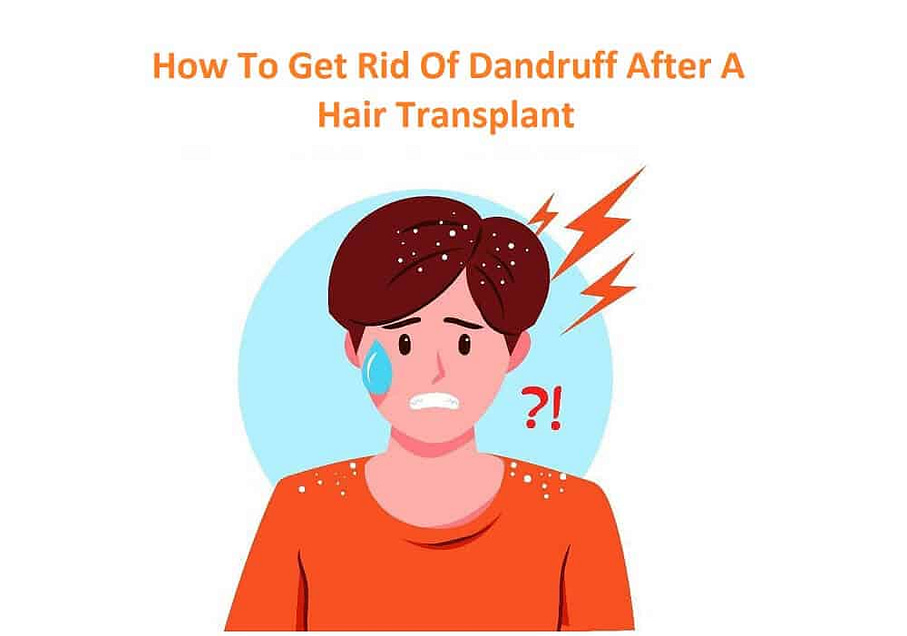
Introduction:
A hair transplant is the second-line solution to baldness and excessive hair loss. It is an aesthetic cosmetic surgery that aims to resolve the baldness problem. In this cosmetic procedure, hair transplant surgeons pick hair follicles from the donor area of the patient’s scalp and transplant them onto the bald area. Hair transplant surgery is gaining traction over the years because of its high success rate with aesthetic results.
We all love dense, voluminous hair; that’s why hair transplant has become so famous. But nobody likes bright white flakes swept off their neck and shoulder just after a hair transplant surgery. Bright white flakes are nothing but dandruff, which looks unhygienic; even this can make you feel embarrassed and uncomfortable.
After a hair transplant, every patient develops mild to moderate dandruff levels. Nothing to worry about. But, if anyone faces severe dandruff issues after the hair transplant surgery, he/she needs medical attention. It should not be treated with anti-dandruff shampoo available in the market. Instead, patients should use medicated shampoo prescribed by their hair transplant surgeons.
Hair transplant surgeons also suggested not scratching your head with your nails to eliminate dandruff because it may cause hair to fall again. Nizoral (1% Ketoconazole), medicated anti-dandruff shampoo, has become every hair transplant surgeon’s first choice. Additionally, many over-the-counter medications are available to treat dandruff after a hair transplant. Use them after speaking with your doctor.
If you just have done your hair transplant but recurring dandruff issues make you anxious, this article will greatly help you. This article will cover multiple facts on post-hair transplant dandruff issues. So, be with us for authentic solutions.
Is it normal to have dandruff after a hair transplant?
Yes, hair transplant surgeons say that dandruff is ordinary after hair transplant surgery. It is a very common and normal issue. During a hair transplant, the hair grafts are collected from a part of the scalp, which develops significant numbers of micro-wounds. Hence, these micro-wounds take time to heal after surgery, and it is crucial to remove dead skin after complete healing. It is the post-surgical process that contributes to mild to moderate dandruff. This kind of dandruff is a positive sign indicating the healing process is going on. Thus, hair doctors say, having dandruff after a hair transplant is a good thing and a vital sign to observe.
So, dandruff following your hair transplant is a part of the healing process, and it does not indicate that your newly grafted hair health is deteriorating.
Can Dandruff Affect Hair Growth after Hair Transplant?
It is a very common question that comes from hair transplant patients.
We all love our hair because it can make or break our appearance. Therefore, patients who suffer from baldness choose the hair transplant procedure to get permanent, beautiful hair lines. But they feel anxious when they notice flaky white dandruff in their newly grafted hair. Many questions come into their mind, and they wonder whether this dandruff problem would affect the growth of their freshly grafted hair.
As we said earlier, mild to moderate dandruff after a hair transplant won’t affect your hair health. It will not even stop hair growth, but scratching your head with nails to eliminate dandruff will cause hair fall because it causes repeated abrasion on the scalp.
So, if you are experiencing mild to moderate dandruff, it is ok, but if you have excessive dandruff and have the urge to scratch your head with your nails, you must consult your hair transplant surgeon. He will treat this problem medically.
Effective ways to deal with dandruff after hair transplant surgery
Dandruff after a hair transplant is not normal dandruff. So, it should not be treated through non-medicated anti-dandruff shampoos and lotions because they are enriched with strong chemicals which can damage your scalp.
You must always use medicated shampoo and lotions that your hair restoration surgeon prescribes, wash your hair with lukewarm water, and keep the hose pressure minimum.
Conclusion:
A hair transplant is an aesthetic procedure that reconstructs our hair lining. Patients who have taken hair transplant solutions expect good hair health after surgery. But every hair transplant clinic is not worth believing. Like any surgical field, hair transplant also requires certification and experience. Thus, we suggest you choose the best hair transplant in Gurgaon that meets all necessary expectations and provides comprehensive post-surgical care. A leading hair transplant clinic not only performs hair transplant surgery but also provides constant assistance during rehabilitation. The surgical success rate depends upon the method of wound healing. Therefore, you must speak with the hair transplant surgeon in detail. Also, you should ask as many questions as you can so that you get complete clarity.
So, choose wisely for a better result!